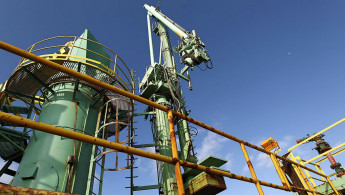Libya resumes oil exports after rebel takeover
A tanker has docked at a Libya's Ras Lanuf port for the first time in two years, as the country's oil company announced it would resume exports "immediately".
The National Oil Corporation [NOC] chairman Mustafa Sanalla said he had accepted control of the ports from forces opposed to the Tripoli government, who captured the "oil crescent" on Monday.
"Exports will resume immediately from Zueitina and Ras Lanuf, and will continue at Brega," Sanalla said, adding Es Sider would also open "as soon as possible".
He added the decision was taken according to instructions from both the UN-backed Government of National Accord (GNA) and Libya's eastern Tobruk parliament.
The NOC is also lifting force majeure at all "oil crescent" ports, a necessary step to resuming oil exports.
Force majeure is a legal term that frees a company from any contractual obligation due to circumstances beyond its control.
| Read also: Haftar plays the oil card in Libya's conflict |
A port official at Ras Lanuf said a tanker had docked to load crude at the port early on Thursday, the first to do so since at least 2014, and that a second tanker had docked at Brega, which has remained open.
An oil official said production had restarted on Thursday at the Nafoura field, which was closed in November 2015 due to force majeure at Zueitina port.
Libya, which has Africa's largest oil reserves, has only managed to export a few tankers of crude in recent months, with efforts to revive the industry thwarted by extremist attacks and political turmoil.
The country's crude oil reserves are estimated at around 48 billion barrels.
Meanwhile GNA Prime Minister Fayez al-Sarraj has demanded urgent talks following the rebel takeover, led by General Khalifa Haftar.
US and European powers have also condemned Haftar's move, warning of a UN Security Council resolution against "illicit" exports made outside the authority of the GNA.
Sanalla, meanwhile, said it could lead to "new phase of cooperation" between Libya's factions.





 Follow the Middle East's top stories in English at The New Arab on Google News
Follow the Middle East's top stories in English at The New Arab on Google News
![Netanyahu furiously denounced the ICC [Getty]](/sites/default/files/styles/image_330x185/public/2024-11/GettyImages-2169352575.jpg?h=199d8c1f&itok=-vRiruf5)
![Both Hamas and the Palestinian Authority welcomed the ICC arrest warrants [Getty]](/sites/default/files/styles/image_330x185/public/2024-11/GettyImages-2178351173.jpg?h=199d8c1f&itok=TV858iVg)
